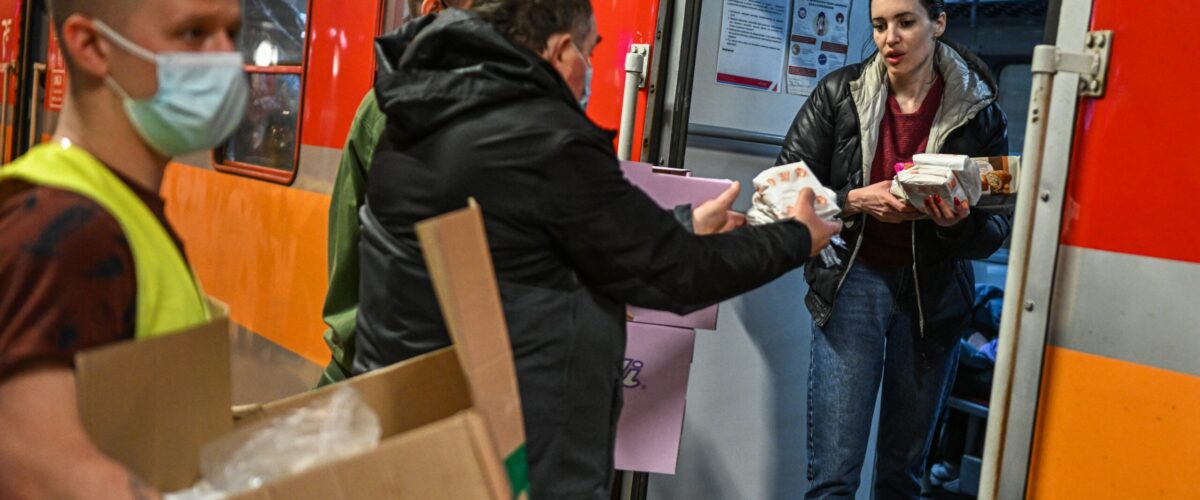In the season of Lent 2022, our world is at war. No, it’s not World War III. Not yet. But if you think the Russo-Ukrainian conflict has no worldwide implications, you’ve not stopped at the gas pump lately.
Last January when our family’s great friend, Alfonso Armada — Spanish playwright, journalist, and editor of the online journal FronteraD — asked me to “give our readers your personal view on the meaning of Jesus in these odd times,” neither of us had any idea that Vladmir Putin would initiate a war to annex neighboring Ukraine. We also failed to realize how globally prescient was the second part of Alfonso’s request, “and how there are so many lost and angry everywhere.”

Bill Leonard
On Feb. 24, 2022, Russian dictator Vladimir Putin instigated an unprovoked invasion of Ukraine. Six days later, March 2, Lent began for Roman Catholics and Protestants around the world. “Great Lent” observances for the Russian Orthodox Church got under way on March 7, the same day global oil prices reached a level not seen since 2014.
Putin delayed the war’s start as a favor to comrade Xi Jinping, general chairman of the Chinese Communist Party, until the Winter Olympics concluded there on Feb. 20. Four days later, Russian troops struck Ukraine. In spite of Putin’s much-touted loyalty to the Russian Orthodox Church, Lent received no such accommodation. If Putin thought of Lent at all, it was simply as collateral damage, defined as “injury inflicted on something other than an intended target, specifically civilian casualties of a military operation.”
Since there is every indication that Ukrainian women, children and men are actually “intended targets,” bombed out of homes, schools, hospitals, mosques, churches and escape routes, then Lent 2022 is inseparable from their sufferings. As Paul the Apostle wrote to the church at Corinth, in the body of Christ, “that there may be no dissension within the body, but the members may have the same care for one another. If one member suffers, all suffer together with it; if one member is honored, all rejoice together with it.”
In Lent 2022, if Christians choose to follow Jesus along the Via Dolorosa, we’ll need to take a spiritual detour through Kyiv, Mariupol, Irpin and Lviv, or avoid social media altogether. And, if able, we’ll have to commit ourselves to providing material support to organizations assisting the more than two million Ukrainian refugees exiled by war.

Thomas Merton
This link between Lent and war sent me back to World War II and the words of Trappist Thomas Merton, memorializing his brother John Paul, dead and buried in the North Sea on a bombing run to Mannheim, Germany, during Lent 1943. For years, I read Merton’s poem to my church history classes when we studied Merton during Lent.
For My Brother: Reported Missing in Action, 1943 by Thomas Merton
Sweet brother, if I do not sleep
My eyes are flowers for your tomb;
And if I cannot eat my bread,
My fasts shall live like willows where you died.
If in the heat I find no water for my thirst,
My thirst shall turn to springs for you, poor traveler.
Where, in what desolate and smokey country,
Lies your poor body, lost and dead?
And in what landscape of disaster
Has your unhappy spirit lost its road?
Come, in my labor find a resting place
And in my sorrows lay your head,
Or rather take my life and blood
And buy yourself a better bed
Or take my breath and take my death
And buy yourself a better rest.
When all the men of war are shot
And flags have fallen into dust,
Your cross and mine shall tell men still
Christ died on each, for both of us.
For in the wreckage of your April Christ lies slain,
And Christ weeps in the ruins of my spring:
The money of Whose tears shall fall
Into your weak and friendless hand,
And buy you back to your own land:
The silence of Whose tears shall fall
Like bells upon your alien tomb.
Hear them and come: they call you home.
Merton’s Lenten memorial is a call for us to pursue “the meaning of Jesus in these odd war times,” renewing our connection to Jesus, along “the way of the Cross.”
With that in mind, I went looking for ways to think about the “meaning of Jesus” in times such as these. Here’s a bit of what I found for my own Lenten reflection:
- In Meeting Jesus Again for the First Time, New Testament scholar Marcus Borg wrote: “Believing in Jesus does not mean believing doctrines about him. Rather, it means to give one’s heart, one’s self at its deepest level, to … the living Lord.”
- In A New Kind of Christianity, theologian Brian McLaren confesses that “in the midst of persecution and martyrdom, that poor unarmed Galilean riding on the donkey, hailed by the poor and hopeful, is the one to trust.”
- In The Challenge of Jesus: Rediscovering who Jesus Was and Is, biblical scholar N.T. Wright insists, “We cannot assume that by saying the word Jesus, still less the word Christ, we are automatically in touch with the real Jesus who walked in first-century Palestine.”
- In Wishful Thinking, Frederick Buechner says following Jesus is “a journey without maps, not being sure of where you’re going but going anyway.”
- African American writer, preacher and mystic Howard Thurman said it like this: “Christianity as it was born in the mind of this Jewish teacher and thinker appears as a technique of survival for the oppressed. That it became, through the intervening years, a religion of the powerful and the dominant, used sometimes as an instrument of oppression, must not tempt us into believing that it was thus in the mind and life of Jesus. … Wherever his spirit appears, the oppressed gather fresh courage, for he announced the good news that fear, hypocrisy and hatred, the three hounds of hell that track the trail of the disinherited, need have no dominion over them.”
Each year, Lent calls us to remember that this holy season began as Jesus of Nazareth confronted first century events of life and death, good and evil, bravery and betrayal, freedom and oppression, fake news and good news, events confronting his church in Lent 2022.
Given that reality, Thomas Merton’s words from wartime 1943 become a wartime 2022 Lenten confession:
For in the wreckage of our April Christ lies slain,
And Christ weeps in the ruins of our spring …
Let us remember that this year on our way to Golgotha, with Jesus.
Bill Leonard is founding dean and the James and Marilyn Dunn professor of Baptist studies and church history emeritus at Wake Forest University School of Divinity in Winston-Salem, N.C. He is the author or editor of 25 books. A native Texan, he lives in Winston-Salem with his wife, Candyce, and their daughter, Stephanie.
Related articles:
As Ukrainian Baptists continue to shelter and feed neighbors, a CBF ministry center is bombed
Religious liberty in Ukraine is ‘doomed’ if Russian invasion succeeds
‘Will it come like this, the moment of my death?’ Living and dying in a COVID-19 world | Opinion by Bill Leonard
The meaning of Jesus in these odd times, part two | Opinion by Bill Leonard
The meaning of Jesus in these odd times | Opinion by Bill Leonard


